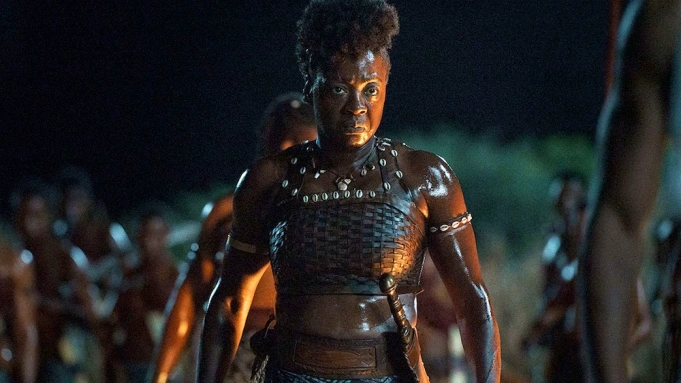Viola Davis’ new period film “The Woman King” is more than a semi-historical exploration of the Agojie, the warrior women of the Dahomey Kingdom in Africa. It is a story of sisterhood outside of the gaze of patriarchy, it is about coming to terms with your own origin story, the rejection of the trans-Atlantic slave trade, and simply put, the beauty of Black women in their purest form.
The Dahomey Kingdom, an empire in West Africa that existed roughly from 1625 to 1894, grew to its most prominent as allies to slavers up until 1852. During this time, according to The Women Soldiers of Dahomey by Sylvia Serbin, the Agojie army (also called the Dahomey Amazons) amassed thousands of warrior women and were some of the most feared soldiers along the coast and central Africa, and even against the French.
Oral tradition speaks about the last Agojie, who died at the age of 100 in 1979. Her name was Nawi and she is the featured character in the Gina Prince Bythewood-directed masterpiece, “The Woman King.”
Davis’ character Nanisca, general of the all-female army, is not just an accomplished fighter, but the prize advisor to King Ghezo—leading his Royal guard— and the model for all of the other young women who desired to dedicate their lives to the sorority of muscle-glistening warriors.
Nanisca is supported by her lieutenant Amenza (Sheila Atim) and third in command Izogie (Lashana Lynch), who throughout the movie remind their general she is human.
All of their mahogany brown skin draped over those perfectly toned bodies, was as breathtaking as the lush African scenery shot by Oscar-Contending Director of Photography, Polly Morgan.
The core of the story centers around Nawi (Thuso Mbedu), a young woman whose family deems her worthless because she never submitted to a husband. As a result, her father takes her to the king’s palace, where the Agojie lived and trained.
There, she is accepted. Her value is not measured by matrimony. She is included in the family of the Agojie, a sacrifice that required her and the other girls her age to take a blood oath of celibacy and childlessness in order to be initiated, instructed, and later inducted. Now, as women warriors they will have the respect of the villagers and be protected from the various kinds of assault women of all cultures are subjected to when they are viewed as beneath their male counterparts.
Nanisca has three very clear enemies in the film.
The obvious one is the military foe, the Oyo empire. This slave-selling group is led by a General that years prior, violated the female general in the worse way possible to these Amazonian Dahomey. Her counsel to King Ghezo is to shift from blooding their hands working with them in the slave trade, selling other Africans, and dishonoring themselves before their deities and ancestors, to trading textiles like palm oil and precious metal.
Throughout the film the threat of the Oyo is met with resilience, strategy, and might of an army of women, winning against these masculine brutes in hand-to-hand combat.
The second enemy is one of the king’s wives, who seeks power and desires to be the most influential figure in his court. The clash between Nanisca and this first wife is subtle, as the general refuses to engage her. Still, the wife is as cunning as she is beautiful, and works to use her husband’s affection for her as a manipulative way to give her higher status.

The third enemy is herself. Nanisca is a top-notch killing machine because she has allowed something very necessary for living to die in her. This suppression of trauma serves her well until fate places her face-to-face with one of the ugliest realities she has worked hard to forget. In fact, Nawi’s character challenges her, forcing her to reckon with the woman she once was, and the one she could be as the Woman King.
The screenplay was masterfully written by Dana Stevens and Maria Bello, who combine the historicity of the Agojie with the compassion of sister circles and the actualization of comic book super-sheroes. Interestingly enough, the Dora Milaje from the hit Marvel franchise, the Black Panther, is based on the Agojie. Their 2018 debut into Americana on a massive scale, opened the appetite for this movie to not only be made but received with open arms and pride.
A Black Girls Rock-sponsored private screening of “The Woman King” welcomed an auditorium of approximately 100 people, all of African descent. As the influencers left the screening room, there were tears mixed with an overwhelming acknowledgment that they had experienced something otherworldly. While some bet the film will be nominated for Best Film at the Oscars, others just were in awe … soaking up the feeling of unspeakable pride felt after the first watch.
So frequently, movies about Africa and slavery make Black people feel dejected, compromised, or angry. Likewise, films about the Black feminine follow dated tropes like “the sister girl,” “the smart best friend,” “the promiscuous one,” “the superwoman/ don’t need a man” or “the mammy.” This marriage of Blackness and womanhood is a tribute to all that is sacred in melanated women.
This love letter to Black women throughout the diaspora does not ignore slavery (even showing in the movie the strength of an enslaved African mother through the good natured-ness of her biracial son) but examines the divine power of the ones, that science says were the first human beings.
One might go in to celebrate a woman king, but you will leave out just celebrating a beautiful tale of womanism, across the board.
For More Information on The Agojie aka the Dahomey Amazons
